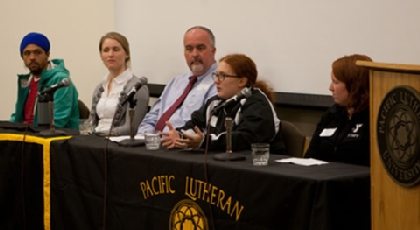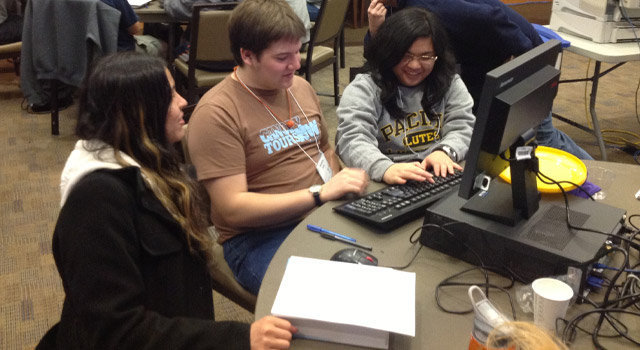Page 330 • (3,679 results in 0.032 seconds)
-
and much more interested in getting down and dirty in the trash (after donning thick leather gloves of course). Comments before the sort ranged from “I don’t like the looks of this lab,” to “eew,” to “Oh great, this is one of my favorites.” The students even learned a few things during the sort. Yes, paper that has been stained by food can be composted. You can recycle milk cartons and potato chip bags. You can’t recycle plastic bottle caps or plastic forks. McConathy also reminded students to
-
March 9, 2009 Sludge from the grill to be recycled The gooey mess which sloughs from the grill at the UC may look like something that you’d rather just toss and forget about. But to Wendy Robins and Colin Clifford, it’s pure gold. Or more specifically, the yellow smelly gunk means that PLU will be paid $100 a year to sell its grease to the Arlington-based Standard Biodiesel, rather than pay a rendering plant $300 a year to get rid of the mess, said Robins, day operations manager for dining
-

October 28, 2011 A passion for learning is explored By Chris Albert The route to being an educator may vary, but a key ingredient is being passionate about being a life-long learner. It’s a sentiment the panel of current educators and PLU alumni shared with students during the Career Connections in Education discussion in October. A panel of PLU alumni share their experiences with current students about life as educators. “You have to have that whole idea that you’re going to be a life-long
-

‘Namibia Nine’ Premieres to Full, Excited Crowd Posted by: Sandy Dunham / March 2, 2015 Image: President Thomas W. Krise, left, joins the “Namibia Nine” film team and Namibian PLU graduates at the documentary’s premiere Feb. 28. (Photo: John Froschauer) March 2, 2015 By Matthew Salzano ’18PLU Marketing & CommunicationsTACOMA, Wash. (March 2, 2015)—Namibia Nine, the PLU-produced documentary depicting the journey of nine Namibian students back in their homeland after graduating from Pacific
-

them in a different, new direction: sound design. Hanne was in charge of designing the foley work and soundtrack for the production. The most interesting part of the process for them was researching and experimenting with different foley sounds. In typical filmmaking, foley is the reproduction of everyday sounds that are layered on top of the visuals, as not every sound can be recorded straight from the source. Many hours of work went into determining the methods and tools to perfectly reproduce
-

from completing their journey to graduation — and what a journey it has been.“Having the 253 PLU Bound scholarship enabled me to come to a great school, major in nursing … and be a part of this tight-knit community,” said Alex Gutierrez ‘20. “Going to PLU was just a dream come true.” Before becoming a 253 PLU Bound recipient, Gutierrez was considering attending a community college due to financial constraints. A timely meeting with a PLU admissions counselor, however, inspired him to take
-

them in a different, new direction: sound design. Hanne was in charge of designing the foley work and soundtrack for the production. The most interesting part of the process for them was researching and experimenting with different foley sounds. In typical filmmaking, foley is the reproduction of everyday sounds that are layered on top of the visuals, as not every sound can be recorded straight from the source. Many hours of work went into determining the methods and tools to perfectly reproduce
-
January 18, 2008 PLU archaeologist uncovers Egypt’s secrets In high school, Lisa Vlieg ’07 told her friends that one day they’d see her on the Discovery Channel. While her dream has yet to come true, the recent graduate may be one step closer after spending five weeks this fall in Egypt’s famed Valley of the Kings. Vlieg accompanied Faculty Fellow Don Ryan ’79 and his team to the ancient burial ground for the seventh field season of the Pacific Lutheran University Valley of the Kings Project
-
September 3, 2009 New Chemistry department instrument will help students and profs probe world of the atom It looks like a rather fat, squat water heater. But to the students and professors gathered around it – or, more accurately, the computer that transmits readouts from it, the machine is pure magic. It is called a nuclear magnetic resonance spectrometer, or NMR. Today, the students from Professor Neal Yakelis’ organic chemistry lab are trying to figure out the structure of an unknown
-

November 12, 2012 A group of nine Computer Science and Computer Engineering students competed at an international computer programming competition Nov. 3. Team sets sights on next year By Jesse Major ’14 A group of nine Computer Science and Computer Engineering students competed at an international computer programming competition Nov. 3. First time competitor, Ben Landes ’14, described the Association for Computing Machinery International Collegiate Programming Contest as “sports for nerds
Do you have any feedback for us? If so, feel free to use our Feedback Form.


